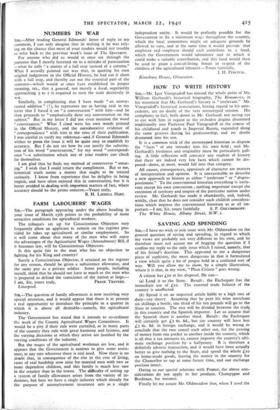SIR, —After reading General Edmonds' letter of reply to my comment,
I can only imagine that in writing it he was rely- ing on the chance that most of your readers would not trouble to refer back to the previous week's issue of The Spectator.
For anyone who did so would at once see through the pretence that I merely fastened on to a mistake of punctuation —what he calls " a matter of a full stop instead of a comma." What I actually pointed out was that, in quoting his own original judgement in the Official History, he had cut it short with a full stop, and thereby cut out the essential part of the sentence—which would at once have established its proper meaning, viz., that a general, not merely a local, superiority approaching 3 to r is required to turn the scale decisively in war.
Similarly, in complaining that I have made " an unwar- ranted addition " (!), he represents me as having said in my letter that I based it on " a conversation " with him—and he then proceeds to " emphatically deny any conversation on the subject." But in my letter I did not even mention the word " conversation." What I cited were his own words printed in the Official History, and the corroborative evidence of " correspondence " with him at the time of their publication.
I was careful to verify my reference—and if General Edmonds wishes to press. the issue it will be quite easy to establish its accuracy. But I do not see how he can justify the substitu- tion of his word " conversation," for my word " correspond- ence "—a substitution which any of your readers can check for themselves.
I am glad that he finds my method of controversy " amus- ing." I wish that I could return the compliment. But to me, historical truth seems a matter that ought to be treated seriously. I know from experience that he delights in being impish, and have often enjoyed this in conversation, but it is better avoided in.dealing with important matters of fact, where accuracy should be the prime concern.—Yours truly,
B. H. LIDDELL HART.






































 Previous page
Previous page